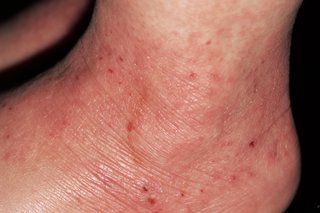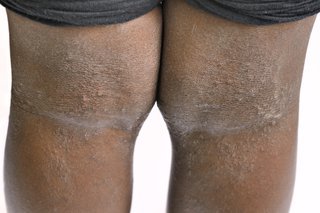Eczema is a skin condition that causes areas of skin to become itchy, dry, cracked, sore and red.
It is sometimes called dermatitis or atopic eczema.
Symptoms
Eczema causes areas of skin to become itchy, dry, cracked, sore and red.
There are usually periods where the symptoms improve. This is followed by periods where they get worse (flare-ups). Flare-ups may occur as often as 2 or 3 times a month.
Eczema can happen all over the body. It's more common on the hands (especially fingers), the insides of the elbows or backs of the knees. It also occurs on the face and scalp in children.


The severity of eczema can vary a lot from person to person.
People with mild eczema may only have small areas of dry skin that are itchy every now and again.
In more severe cases, eczema can cause widespread red, inflamed skin all over the body. It also causes constant itching.
Scratching can disrupt your sleep, make your skin bleed, and cause secondary infections. It can also make itching worse.
A cycle of itching and regular scratching may develop. This can lead to sleepless nights and difficulty concentrating.
Part of skin affected by eczema may also turn darker or lighter. This can happen after the condition has improved. This is more noticeable in people with darker skin.
It's not a result of scarring or a side effect of steroid creams. It can be more of a "footprint" of old inflammation and eventually returns to its normal colour.
Signs of an infection
Areas of skin affected by eczema can become infected.
Signs of an infection can include:
- your eczema getting a lot worse
- fluid oozing from the skin
- a yellow crust on the skin surface or small yellowish-white spots appearing in the eczema
- the skin becoming swollen and sore
- a high temperature (fever) and generally feeling unwell
Urgent advice: Speak to your GP as soon as possible if:
- you think your or your child's skin may have become infected
Causes of eczema
Eczema is likely to be caused by a combination of things.
People with eczema often have very dry skin. This is because their skin is unable to hold on to moisture.
This dryness may make the skin more likely to react to certain triggers, causing it to become red and itchy.
You may be born with a higher chance of developing eczema. This could be because of the genes you inherit from your parents.
If either of your parents or siblings had eczema, you are more likely to develop it.
Eczema is not infectious, so it cannot be passed on through close contact.
Eczema triggers
There are a number of things that may trigger your eczema symptoms. These can vary from person to person.
Common triggers include:
- irritants - such as soaps and detergents, including shampoo, washing up liquid and bubble bath
- environmental factors - such as cold and dry weather, and dampness
- allergens - such as house dust mites, pet fur, pollen and moulds
- food allergies – such as allergies to cows' milk, eggs, peanuts, soya or wheat
- certain materials worn next to the skin – such as wool and synthetic fabrics
- hormonal changes – women may find their symptoms get worse in the days before their period or during pregnancy
- skin infections
Some people also say their symptoms get worse when the air is dry or dusty. Symptoms may also get worse when people are stressed, sweaty, or too hot or too cold.
If you're diagnosed with eczema, your GP will help you to try to identify any triggers for your symptoms.
Other types of eczema
Eczema is the name for a group of skin conditions that cause dry, irritated skin.
Other types of eczema include:
- discoid eczema - a type of eczema that occurs in circular or oval patches on the skin
- contact dermatitis - a type of eczema that occurs when the body comes into contact with a particular substance
- varicose eczema - a type of eczema that most often affects the lower legs and is caused by problems with the flow of blood through the leg veins
- seborrhoeic eczema - a type of eczema where red, scaly patches develop on the sides of the nose, eyebrows, ears and scalp
- dyshidrotic eczema (pompholyx) - a type of eczema that causes tiny blisters to erupt across the palms of the hands
Diagnosis
There is no diagnostic test for eczema. Your GP will be able to tell just by looking at your skin if you have eczema.
Content supplied by the NHS and adapted for Ireland by the HSE
